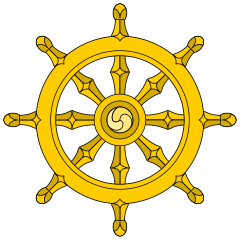Aṅguttara Nikāya
The Anguttara Nikaya (aṅguttaranikāya; lit. 'Increased by One Collection', also translated "Gradual Collection" or "Numerical Discourses") is a Buddhist scripture, the fourth of the five nikayas, or collections, in the Sutta Pitaka, which is one of the "three baskets" that comprise the Pali Tipitaka of Theravada Buddhism. This nikaya consists of several thousand discourses ascribed to the Buddha and his chief disciples arranged in eleven nipatas, or books, according to the number of dhamma items referenced in them.
| Part of a series on |
| Buddhism |
|---|
 |
|
|
|
The Anguttara Nikaya corresponds to the Ekottara Āgama ("Increased by One Discourses") found in the Sutra Pitikas of various Sanskritic early Buddhists schools, fragments of which survive in Sanskrit. A complete version survives in Chinese translation by the name Zēngyī Ahánjīng (增一阿含經); it is thought to be from either the Mahāsāṃghika or Sarvāstivādin recensions. According to Keown, "there is considerable disparity between the Pāli and the Sarvāstivādin versions, with more than two-thirds of the sūtras found in one but not the other compilation, which suggests that much of this portion of the Sūtra Piṭaka was not formed until a fairly late date."[1]
Translations
Full translation
- The Book of the Gradual Sayings, tr F. L. Woodward & E. M. Hare, 1932–6, 5 volumes, Pali Text Society, Bristol
- Numerical Discourses of the Buddha, tr Bhikkhu Bodhi, 2012, 1 volume, Wisdom Publications , Somerville, MA
- Bhikkhu Sujato (trans.), The “Numbered” or “Numerical” Discourses, 2018, published online at SuttaCentral and released into the public domain.
Selections
- 1st 3 nipatas tr E. R. J. Gooneratne, Ceylon, c1913
- 4th nipata tr A. D. Jayasundare, London, 1925
- anthology ed & tr Nyanaponika, Buddhist Publication Society, Kandy, Sri Lanka; revised, with additions & deletions, by Bodhi, as Numerical Discourses of the Buddha, Altamira Press, Oxford/New York/Lanham, Maryland/Walnut Creek, California, 1999
Divisions
The nipatas in this nikaya are:
- Ekakanipāto (The Book of Ones)
- Dukanipāto (The Book of Twos)
- Tikanipāto (The Book of Threes)
- Catukkanipāto (The Book of Fours)
- Pañcakanipāto (The Book of Fives)
- Chakkanipāto (The Book of Sixes)
- Sattakanipāto (The Book of Sevens)
- Aṭṭhakanipāto (The Book of Eights)
- Navakanipāto (The Book of Nines)
- Dasakanipāto (The Book of Tens)
- Ekādasako nipāto (The Book of Elevens)
Appreciation
Translator Bhikkhu Bodhi wrote: "In Anguttara Nikaya, persons are as a rule not reduced to mere collections of aggregates, elements, and sense-bases, but are treated as real centers of living experience engaged in a heartfelt quest for happiness and freedom from suffering." (from Intro to Samyutta Nikaya)
See also
- Buddhist Texts
- Digha Nikaya
- Khuddaka Nikaya
- Majjhima Nikaya
- Pali Canon
- Samyutta Nikaya
- Bhikkhu Bodhi
References
- A Dictionary of Buddhism, by Damien Keown, Oxford University Press: 2004
External links
| Wikiquote has quotations related to: Aṅguttara Nikāya |
- Anguttara Nikaya in Pali, English and Sinhala (metta.lk)
- English Translations of the Anguttara Nikaya (accesstoinsight.org)
- English translations by Bhikkhu Bodhi of selected Suttas from the Anguttara Nikaya at Wisdom Publications